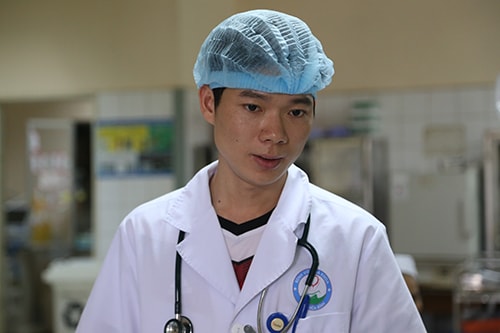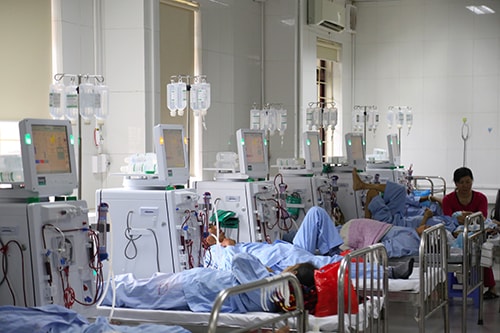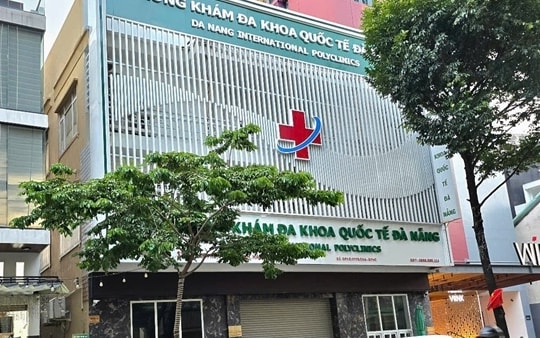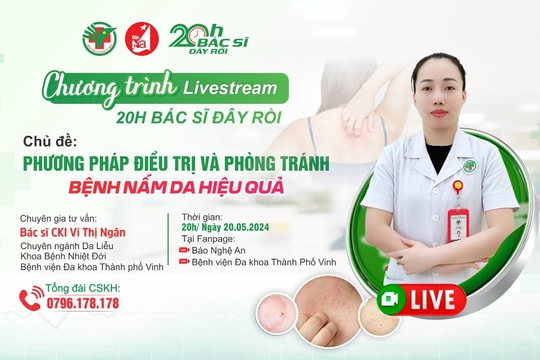This morning, doctor Hoang Cong Luong appeared in court.
On January 8, the People's Court of Hoa Binh city is expected to reopen the first instance trial of 7 people in the medical incident that caused 9 patients to die.
Hoang Cong Luong and Bui Manh Quoc appeared in court on charges of crime.Involuntary manslaughteraccording to Clause 2, Article 98 of the 1999 Penal Code with a penalty of 3 to 10 years in prison.
Truong Quy Duong (former hospital director), Hoang Dinh Khieu (former hospital deputy director), Tran Van Thang (former head of the supplies department), Tran Van Son (officer of the supplies department) and Do Anh Tuan (Director of Thien Son Pharmaceutical Joint Stock Company) appeared in court for the crime ofLack of responsibility causes serious consequences, according to Clause 2, Article 285 of the 1999 Penal Code with a penalty of 3 to 12 years in prison.
Before the resumption of the trial, the defendant Luong’s wife said that he was being treated at the hospital in a state of panic. She also submitted a petition to the People’s Court of Hoa Binh City, asking the court to allow him to be tried in absentia on the opening day.
On January 3, the Vietnam Medical Association sent a document to the prosecution agencies of Hoa Binh province, stating that the cause of the incident was due to the residual HF chemical in the dialysis water after repairing the RO system. "The system repair was done by someone else, so is Luong guilty?"Involuntary manslaughteror not?", the General Assembly stated its opinion.
The Vietnam Medical Association requested the competent authority to consider that on the day of the incident, the machinery was operating normally and the RO system's conductivity meter was within safe limits, so "no one could have foreseen the fatal consequences that would occur."
 |
| Hoang Cong Luong while working at Hoa Binh General Hospital. Photo: Pham Du. |
The case was first tried in mid-2018 with 3 defendants, but after about 20 working days, the People's Court of Hoa Binh City announced to return the file for further investigation. After more than 6 months, 4 more people were prosecuted.
According to the indictment, on the morning of May 29, 2017, 18 patients undergoing dialysis at Hoa Binh General Hospital showed signs of abnormality. 9 people died. The cause was due to the water source for dialysis not being guaranteed.
The prosecution alleges that since its establishment, the Dialysis Unit (under the Intensive Care Unit) has had no engineers or technicians and no one has been assigned to check the quality of water during and after dialysis. After the patient is examined, the doctor will order dialysis when he/she sees that their vital signs are satisfactory.
If equipment needs to be repaired, the dialysis unit will request the supply department to coordinate with the departments and divisions to carry out the repair. Repairs are usually made on Sundays so that the dialysis unit can start dialysis on the following Monday without having to wait for water quality testing or acceptance.
Luong is accused of having expertise and training in performing periodic blood filtration using artificial kidney techniques. He was ordered by the department head to sign a proposal to repair and maintain RO water filtration system No. 2, so he knew the specific repair time. Luong is also the only doctor among the three assigned to treat patients in the blood filtration unit who is qualified to issue dialysis orders.
On May 29, 2017, Luong signed the medical orders of the other two doctors in the unit to perform blood filtration for the patients, so he had to take professional responsibility for the treatment that day. He also had to know that the water used in blood filtration had to be of guaranteed quality after repair. However, he only heard the nurse say that the system had been repaired, so he gave the treatment orders.
 |
| A patient undergoing hemodialysis at Hoa Binh General Hospital. Photo: Pham Du. |
According to the accusation, Mr. Truong Quy Duong did not fully perform his assigned tasks, loosened management, and failed to check on his subordinates, allowing serious violations to occur over a long period of time. He directly signed the decision to establish a blood filtration unit but did not arrange for personnel to check the water quality before, during, and after dialysis.
As the director, he did not issue regulations on operation, maintenance and safety techniques for using the RO system, allowing employees to use it arbitrarily. Mr. Duong signed contracts and terminated repair contracts but did not closely inspect, resulting in the deaths of 9 people.
Thien Son Company Director Do Anh Tuan was accused of directly signing the contract to repair and maintain the RO2 system with the hospital but let Bui Manh Quoc do it. Mr. Tuan was accused of not fully performing his duties, allowing Quoc to arbitrarily use unlicensed chemicals to disinfect the equipment, leading to extremely serious consequences.
As the Deputy Director in charge of the department, defendant Hoang Dinh Khieu was responsible for the quality of the water used. However, Mr. Khieu was lax in management and lacked supervision of his subordinates, allowing the Blood Filtration Unit to arbitrarily put the RO water filtration system into use after repairing and maintaining it without test results for a long time.

.jpg)






